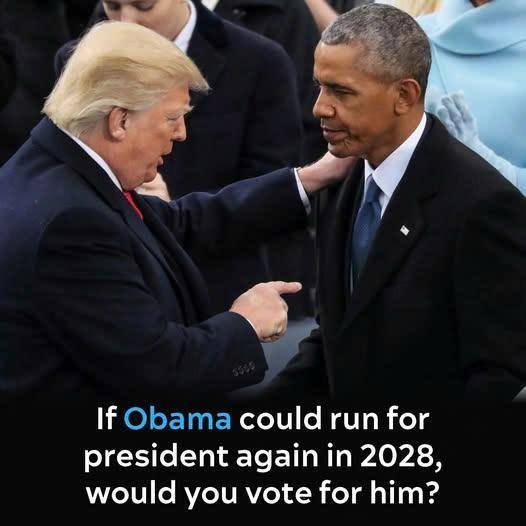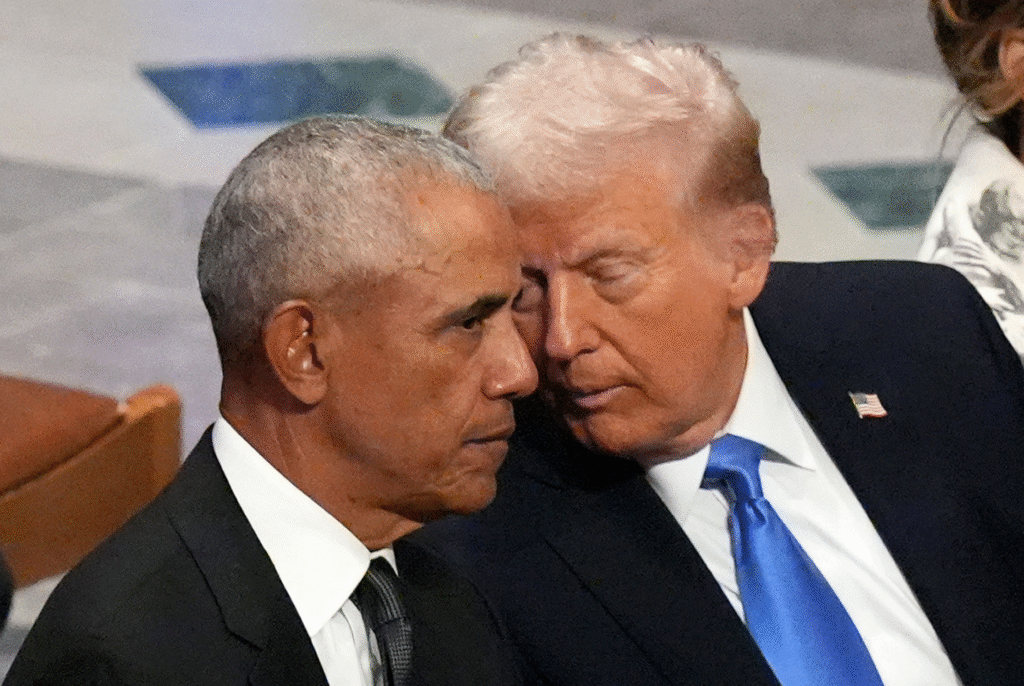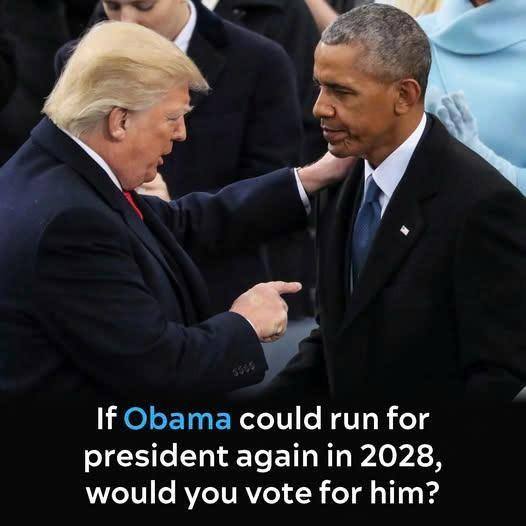In an age where politics seem to be more polarized than ever, it’s hard to imagine a time when a leader could inspire both hope and criticism in such an equal measure. Yet, one name remains a subject of discussion, debate, and curiosity in American political circles: Barack Obama. Though the 44th President of the United States left office nearly a decade ago, his legacy still looms large, and the possibility of his return in 2028 stirs up both excitement and trepidation.
The question itself, “If Obama could run again in 2028, would you vote for him?” might seem almost paradoxical at first, given that the US Constitution prohibits any president from running for more than two terms. Yet, posing such a question is enough to spark a worldwide conversation about leadership, democracy, and the values we want to see reflected in the leaders who represent us.

Obama, with his iconic calm demeanor, eloquent speeches, and vision for a united America, continues to be an enduring symbol of hope for many. His time in office marked an era of progressive policy, forward-thinking foreign relations, and a steady hand in the face of turmoil. He managed to navigate both domestic challenges and international crises, leaving behind a legacy that continues to shape political discourse today. But would he be the right choice in 2028? And, more importantly, what does his potential candidacy represent in the ever-changing landscape of American politics?
A Symbol of Hope and Unity

For those who supported him during his presidency, Barack Obama is far more than just a political figure—he embodies a vision of hope, unity, and progress. His presidency, despite the challenges he faced, was rooted in the belief that the United States could overcome division and that together, Americans could build a better future.
Obama’s ability to bring people together, his thoughtful approach to policy, and his unshakeable belief in democracy made him an inspiring leader. His speeches, often filled with optimism and calls for collective action, resonated deeply with millions of Americans who saw him as the antidote to years of political gridlock. His 2008 campaign slogan, “Yes We Can,” was more than just a catchy phrase; it was a rallying cry for change, a message that carried the hopes of people who believed in the possibility of a better tomorrow.
The emotional connection that many people still have to Obama is undeniable. His words, both spoken and written, continue to resonate with those who see him as a beacon of hope in a world that seems increasingly divided. Even in his post-presidency years, Obama’s influence has remained strong, with his advocacy for issues like climate change, healthcare reform, and social justice continuing to shape public policy.
If Obama were to run for president in 2028, his supporters would likely see it as a return to a time when the country was led by someone who embodied their values—someone who had the ability to bring people together, to speak to the best of what America could be, and to tackle difficult issues with grace and intellect.
The Past That Needs to Be Closed?
However, not everyone shares the same fondness for Obama. For his critics, particularly those who oppose his policies or feel that his administration left unresolved issues, Obama represents the past—a past they believe needs to be left behind in favor of a new direction. These critics argue that while Obama’s presidency may have been marked by progressive ideals, it also left many challenges unaddressed—economic inequality, systemic racism, healthcare complications, and foreign policy dilemmas.

For many, Obama’s presidency is viewed as a chapter in American history that is best closed in order to make way for fresh perspectives and new ideas. They believe that the political landscape has shifted significantly since Obama left office, and that the issues of 2028 will require leadership that can adapt to the new challenges of the day. The argument for change, especially from within the political sphere, is rooted in the desire for a leader who can take the country in a direction that’s more in tune with the realities of the modern world, rather than looking back to the past.
But there’s also a deeper, more philosophical question at the heart of this debate: should we continue to look to past leaders, like Obama, for guidance, or should we make room for new leaders who can offer a completely different vision for the future?
What Do We Expect From Our Leaders in 2028?
Perhaps the most important question we must ask ourselves is not about Obama or any other individual candidate, but about what we, as a nation, want from our leaders. As we look toward 2028, we must reflect on what qualities are most important in the individuals who will shape our future.
Vision or Revenge?
In recent years, the political climate in the United States has been characterized by division and anger. The question of whether leaders should prioritize unity and a forward-thinking vision, or whether they should focus on retribution and revenge against political opponents, has been at the forefront of political debates. Obama’s leadership style, which emphasized hope, unity, and bipartisan cooperation, contrasts sharply with the current political climate, where many see the need to “fight back” and “get even” with perceived political enemies.
In 2028, will the American people seek a leader who can heal the divisions and rebuild the country’s faith in its institutions, or will they opt for a leader who promises to hold those responsible for past failures accountable? The choice of leader will come down to what we, as a nation, value more: building a future together or seeking retribution for past wrongs.

Unity or Division?
Obama’s entire political career was built on the idea of unity. He preached that the country could be united despite its differences, and many of his supporters still hold onto that ideal. However, unity has become increasingly difficult to achieve in the face of deep political divisions, both at the national level and within the political parties themselves.
As we move forward into 2028, Americans must decide what they want from their leaders: do they want someone who can bridge the gap between red and blue states, between ideologies, and between different communities? Or do they want a leader who will amplify the divisions, one who will stoke the flames of division to energize their political base?
Trust or Cynicism?
Trust in government and political leaders has eroded in recent years. Scandals, corruption, and the erosion of democratic norms have led many to feel disillusioned with the political system. As a result, the need for leaders who inspire trust, transparency, and accountability has never been greater.
Obama, for all his critics, remains a figure who is largely viewed as trustworthy by a significant portion of the population. His calm, measured approach to governance, his transparency, and his commitment to working within the system earned him the respect of many, even those who disagreed with some of his policies. However, as we look to 2028, the question is whether Americans still have the trust in political leadership to make such a decision. Will voters turn to leaders who offer a sense of security, or will they be drawn to those who promise to dismantle the system and rebuild it from the ground up?

The Legacy of Obama: Is It Time for a Return?
Obama’s legacy, both during his presidency and after, has remained a defining force in American politics. His message of hope, unity, and progress resonated deeply with a generation that saw him as the embodiment of positive change. For many, Obama represents the ideal of what leadership should be: thoughtful, compassionate, and committed to making the country a better place for all its citizens.
But as time has passed, the question remains: is it time for Obama to return? The political world of 2028 will undoubtedly look very different from the one Obama left in 2017, and the challenges facing the country will be both new and old. The question we must ask ourselves is whether Obama’s vision for the future still aligns with the needs of a rapidly changing world, or whether it’s time to hand the baton to a new generation of leaders who can offer fresh ideas.
Conclusion: A Vote for the Future
While the idea of Obama running again in 2028 remains hypothetical, it presents an opportunity for us to reflect on what we want from our leaders. It’s not just about one person—it’s about the values we seek in leadership, the qualities we want to see in those who will shape the future of our nation. As we look ahead to the next presidential election, we must decide whether we’re ready to return to the ideals that Obama represented or whether we’re ready for a new direction.

In a world full of uncertainty, sometimes it’s not just about who we vote for—it’s about what we believe will keep us moving forward. Whether we choose vision or revenge, unity or division, trust or cynicism, the leaders we elect will define the next chapter in America’s story.
If Obama could run again in 2028, would you vote for him? Share your thoughts with us and join the conversation about the future of American leadership. What qualities do you think the next president should embody, and what kind of America do you want to see in the next decade? Let’s continue the discussion about the values that matter most.


